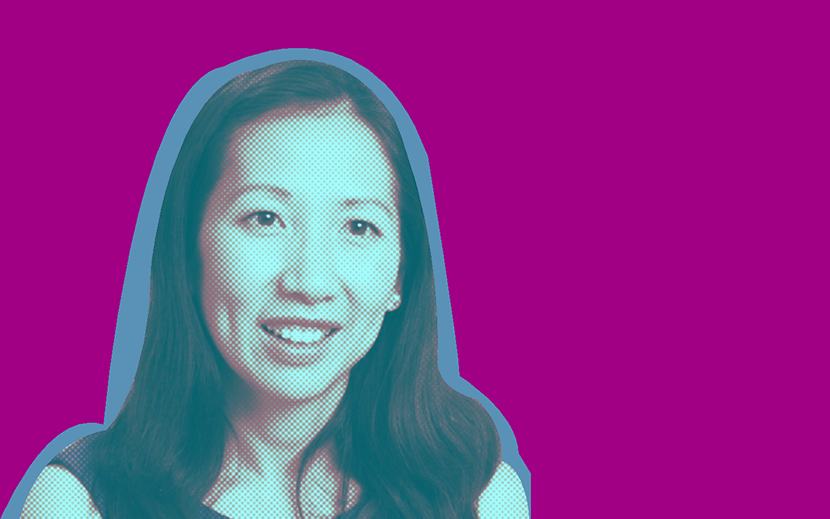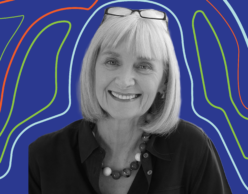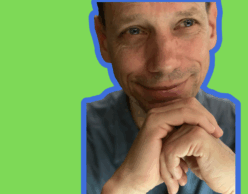Dr. Leana Wen On Taking Care Of Each Other

New Season! We’re kicking off Mash Ups to Know with the newly appointed president and CEO of Planned Parenthood, Dr. Leana Wen! A long time leader and advocate in public health, Dr. Wen’s mission to depoliticize healthcare at the forefront of everything she does.
We talk with her about what it was like to immigrate here from Shanghai at such a young age, how becoming a mother changed the way that she approaches healthcare, and why her mother’s bout with cancer led to her passion for patient advocacy.
An Edited Transcript Of Our Convo:
Dr. Leana Wen: I grew up in Shanghai which is a city of twenty some million people and my parents immigrated like many families do, for better opportunity for me and for us as a family. My parents both faced significant political issues in China and for them, coming here was an important way of making a new life in a different way than they would’ve been able to. And we landed in Logan, Utah, so my mother came …
Rebecca Lehrer: Utah?
Dr. Leana Wen: Initially on a student visa. Yeah, and so she came on a student visa and she was given two choices: she was given the choice of Chicago, Illinois, which is where she’d gotten into school as well and Logan, Utah. And her professor at the time, this is way pre-Google, pre-Yahoo and Alta Vista, whatever, and she asked her professor. Her professor said, “Oh, Utah. Utah is the place to me.”
Rebecca Lehrer: Oh my God. That is the best.
Dr. Leana Wen: And so we ended up there.
Rebecca Lehrer: That feels like, there’s … it’s so common anywhere in the world where we, you know, someone has their english book or whatever it is and it’s somehow 45 years old. And it’s just like, the references in it are just a little out of date. There probably weren’t that many Chinese people in Utah, I’m guessing.
Dr. Leana Wen: No, there weren’t. I think there was one other Chinese family in the entire town that we got to know. But I will say that the people there were so kind. I mean, I was this strange looking kid who didn’t speak english and when we arrived, we were very poor. I mean, my parents saved up, but by the time we paid for our visa and our plane tickets, we had $40.
And my parents both worked multiple jobs, they probably worked two or three jobs each at all times. I mean, this is the typical immigrant story. And we still really struggled to make ends meet. And that’s what we did. I mean, that’s the life that we had there. I remember we were so poor that we couldn’t afford to pay for heating. And I also didn’t have a winter coat. We arrived initially, in January. Or in December, rather. And it was really cold and I just, I remember wearing all these layers of pants to go to school. And all these sweaters. Once I got to school, I’d have to take off all these layers and my teachers had to put my … all my clothes into a special closet.
Amy S. Choi: The image of that is specific and so heart rending. I think it’s an interesting, it’s often an experience that young Mash-Ups have where it’s not just … your parents have come for you, as you say, to give you more opportunity, to build kind of this new life for the next generation. And as part of that, they’re doing all this work to provide for you and you as the kid, are both taking it all in and also now becoming in some ways, like a guide and a caregiver for you parents. I wonder, did you have that? We often talk about how we became the cultural translators or the people that kind of explain to our parents how different things in America worked.
Dr. Leana Wen: That is so interesting. I don’t think I quite thought about it this way, but it is really true. I mean, I see this in my medical practice too. So often, it’s the kids. And we’re talking about teenagers or even younger kids who are doing the actual translating where their parents are getting medical care. Or they are translating the culture and the significance of what’s going on around them.
And actually, for me, I definitely experience this. Including when my mother became ill. My mother was diagnosed with breast cancer when she was 44. She was diagnosed with what turned out to be metastatic breast cancer, actually at the time that she had all of her tests done. And I just remember how big of a disconnect patients face in our medical system anyway. And then you … and on top of that, language barriers, cultural barriers. I mean, my mother thought that she couldn’t say no to the doctor. That if the doctor recommended anything, the doctor was like her parent, right? It was like this authoritarian figure. That she’d be fired by her doctor for asking questions. And I know that that led to worse care for her and for so many other people, particularly immigrants and people of color.
Rebecca Lehrer: How old were you at that time?
Dr. Leana Wen: I was already in medical school, actually. And so, I think … I mean, I might have been, I don’t know, 20 or something like that. So, this is not an experience of me and my childhood when all of this happened, but I think as a medical student, I really saw this disconnect for myself because I knew also that the doctors and nurses who saw my mother, they did have good intentions too. They weren’t trying to treat her poorly.
There were just so many instances though that she and I would walk into an exam room, or a waiting room and the receptionist or somebody would say, “Do you speak english?” And my mother, who has her PhD in the US and I was a medical student, I mean, it’s just something … it’s just another level of subconscious bias that we all face.
Rebecca Lehrer: And I’m curious about … I very much relate to this and my personal life experience is connected to that and I found that I always … “Somebody needs to go with … ” When I found out somebody’s sick or a friend’s parent is sick at this point, I’m like, “Who’s going with them to be their advocate?” In that situation.
But I wonder how that informed … you’re in medical school and this is happening. Or some of the realizations you had in classes or about the care or about even bedside manner and how you might be able to change that given your personal experience.
Dr. Leana Wen: I learned the hard way why it’s so important to be an advocate. To be an advocate for your loved one, to be an advocate for yourself, to be an advocate for our patients. My mother was actually misdiagnosed for over a year before she was finally diagnosed with what turned out to be cancer that had spread to her bones, her brain and her lungs. And I look back and my mother passed away nine years ago, and I think about her every day, especially as I’m a mother myself. And my mother loved kids and I can only imagine how much she would have loved my son.
And I think now, too … all the instances when she called me and she was in LA and I was in St. Louis for medical school and I remember her calling me and telling me that there was something wrong. Something wasn’t … she knew, she just wasn’t feeling right. And I wish that I had pressed her at that time to go to the doctor. I wish that the first time she went to the doctor and was told that she had depression. When she had all these medical symptoms, these physical symptoms. I wish that I had pressed for a second opinion much sooner. I mean, all these are lessons that I take away. I actually ended up writing a book about patient advocacy and how to bridge this disconnect between what patients need and what doctors are trying to do.
And this also very much led me into public health too, because it’s also in the ER … I’m an emergency physician. It’s also in the ER that I saw how much of a disconnect there exists and that disconnect is that we see our patients at one point in time and we may be doing what is best for them in that point and time, but I treated this young boy, a patient who came into the ER all the time for asthma and I would give him an inhaler or breathing treatments and steroids, but he would keep coming back and it’s because him and his mom were homeless. And what we needed to do was provide them also with shelter. And we also had to help them with escaping a situation of violence in the family. These are all the other needs that our patients face too. And it’s also our obligation as the provider, as the physician, as the community to serve those other health needs too.
Rebecca Lehrer: You know, with all your different posts that you’ve have, ER physician, Baltimore city health commissioner, now president of Planned Parenthood, you’ve created such a diverse communities right? Let’s say I’m coming in to an ER, what are some questions that we might ask as we look around, about how … so that we can help make it better?
Dr. Leana Wen: I think it begins before you arrive. Of course, there are some situations when you arrive in the ER in extremis and in extreme distress and you actually, I think you’ll get very good care because that is what we trained to do in emergency medicine. The vast majority of time though, you’ll have time to think about it. You’ll have time to prepare for your doctor’s visit or you ER visit. And what I would encourage you to do is first, bring someone with you. When you’re feeling ill, even if you have a cold or the flu, you’re just not feeling yourself and it’s helpful to bring somebody else there who can be an advocate for you too.
Second thing is write down your questions. Write down not only your questions, too, but also all the things that you’ve experienced, your symptoms, what’s going on in your life. The context of your illness is important too. And of course the medications that you’re taking and any medical problems and allergies that you have.
And the third is when you show up to tell your story, studies have shown that over 80% of diagnoses can be made just based on your history, which is your story. And you know that the best. You are the expert when it comes to your medical history, when it comes to your body. And we as the physicians, we need you to tell us what’s going on. Tell us your story, don’t just list your symptoms, but start from the beginning, talk about what’s going on and put it into the context of your life, so that we can get a better picture of how what you’re coming in with is actually affecting you on a daily basis.
Rebecca Lehrer: Then I want to add here, too, a question, and it’s so extraordinarily helpful, but it’s about … you’re a public health expert. This is what you do. I wonder then, let’s say, a black woman walks in and is gonna tell her story, but saddled with the burden of knowing and having experienced so many times when. Her story has been dismissed.
How can we, as people who are advocating for other people who maybe can’t advocate for themselves in the same way, what can we do to change that? How do we … I mean, we were …
Amy S. Choi: How do we make people listen?
Rebecca Lehrer: We’re trying to undo all the systems of racism. There’s that, but what are some ways that we can actually help people be heard?
Dr. Leana Wen: That is such a good question and actually what you just mentioned makes me think of our maternal mortality rates, which are finally getting the attention that they deserve. It’s horrific. And shameful that the US is the only industrialized country where the rate of women dying in childbirth is actually increasing. It’s higher now than it was in 1990. An African American woman is three to four times more likely to die in pregnancy than a white woman. And when we trace it down to … and look at all the other confounding variables here, even if you take into account educational level and economic, socio-economic status, even all those things being equal, African American women still have a much higher rate of maternal mortality than white women.
And then you just have to wonder about what is the underlying reason. And there is an underlying reason and that is the unconscious bias that is the fact that we have to recognize racism as a public health issue. And our structural racism and systemic in equities has been fundamental to how we got to where we are. And I think that us calling it out and recognizing it is an important part of it and calling out that we need serious investments in race equity inclusion. We need serious investments in training to undo these structures of racism. And then we need systems in place too, that would help us to encounter and face our own biases, as well as how to move forward.
Amy S. Choi: How does planned Parenthood tackle that? The first time I ever got healthcare for myself was as a junior in college was going to a local Planned Parenthood clinic. And I think one of the beauties of the organization is that you can go in and be undocumented. You can go in and not have the resources or the language and PP will help. And that doesn’t matter.
But I wonder, when we talk about systems, it’s like, we all swim in these waters of systemic racism, how, as an organization have you been tackling that and been able to interrogate that?
Dr. Leana Wen: Well, I’m glad you mentioned that you were a patient of Planned Parenthood. I’ve very proud of the fact that one in five women in America have been patients of Planned Parenthood. And that we don’t just serve women. We also serve men. We have a commitment to serving all people. LGBTQ people. We are expanding dramatically our care and our programs for trans people. And we really are proud of serving everyone no matter where you come from, what you look like, whether you can pay.
I mean, I was a patient of Planned Parenthood myself and I just remember when I was 16 years old, coming in to one of the clinics in LA where I was living at the time and being so scared. I mean, I just wanted information and healthcare. But there were so many barriers and so much stigma in place to get something as basic as birth control. And I remember coming in and receiving compassionate care. Actually I remember being so scared that I almost walked out of the waiting room. And just as I was about to walk out, I had someone come to me, a nurse come to me and call my name.
And I actually think that that moment really changed my life because if I had left, I don’t know what other choices I might have made, what resources and information I would have had to guide those choices and I think that the access to reproductive healthcare is fundamental to all people being able to live their dreams. And we face those challenges every day. I mean, our … we have over 600 health centers around the country and over 55 affiliates that run our health centers and I see the challenges that they face.
And I also think that the issue of confronting our systemic biases is something that we have to commit ourselves to because otherwise it becomes something that’s a checked box. And so, in the national office, we just hired a vice president for diversity and equity inclusion. We’re beginning to have race equity inclusion work done throughout our national office and starting to do this with various affiliates across the country. We are expanding our program for gender affirming care. Multiple of our health centers have significant programs on education on civil rights including on voting rights and on your rights as an immigrant. And I think it’s all of those, take into account all of these issues that makes planned Parenthood who we are, which is that we take into account the whole person. And we serve the whole person in the context of where they are in the community to meet the needs of people where they are.
Rebecca Lehrer: Can I ask a question? Because I think … one of the things I hear in getting to hear your personal story and I know that for all of us, we are all informed by our life experiences and it’s only because we’re Mash-Ups we’re told that identity politics and you’re playing your identity too much. I’m like, “Just ’cause that person’s a white man doesn’t mean that they’re neutral by any means.” But I’m thinking about … I wonder if moments your mom’s sickness, and then you just talked about having a child, you have an 18 month old. I wonder how that has in the last 18 months, or even from pregnancy, so the last two and half years, have you become … has anything changed or anything opened up to you in kind of understanding matrescence and becoming a mother, pregnancy, that you might have not before, as a doctor or as a person, been as attuned to?
Dr. Leana Wen: I think about all the patients that I treated, or all my little patients who I treated who are brought in for a variety of things. Crying, for example. I used to think, why is a parent bringing a baby into the ER for crying? Now I really understand!
I actually, I know that being a mom has made me so much of a better doctor because I just relate to what it is that parents go through in a whole different way. And people used to ask me questions because they know I’m a doctor, and they’d say, “Well, my child is only eating this much,” or, “My child only has this many wet diapers a night. Is that normal?” I really would have no idea. I mean, I could look it up in a text book, but I really had no idea. And now I really do. I think that’s something that you learn by going through it.
I think also, though, that, I mean, I shared, recently, just a month ago or so, my personal story with struggling to conceive. My husband and I really wanted kids, but just as we got engaged, I was diagnosed with early cervical cancer and was 27. And it was caught on a routine pap smear. And I’m really glad that it was caught at the time, but I had to have a procedure that did make it harder for us to have kids. And we tried for years to have a child and I feel so lucky that we have our son.
Rebecca Lehrer: Yeah.
Dr. Leana Wen: And I think just about how important it is for all of us to see reproductive healthcare as a continuum. That the same person that I was when I was a teenager that did not wanna get pregnant then, at a later time in my life, I did very much want to get pregnant. And that we can’t think of people as a decision that they have to make at one point in time. We have to think about the whole person. And their entire life and what these decisions mean to them at those various distinct points.
Rebecca Lehrer: As a person who also struggled with fertility stuff, I think that resonates with me, that there’s just so many points in our journey that inform us. Amy and I were talking about this the other day when walking through the world, when you’re struggling with something and you look around and you’re like, “Who knows who else is struggling right now?” And that’s the empathic way to approach it.
And sometimes it’s hard for me when so much of the conversation in our world is so un-empathic. I’m like, “How does that person walk through the world and they got to that age and they didn’t realize that other people are struggling?” What was happening in their lives that they didn’t open their eyes and then … we read your story and I think between your story and Michelle Obama talking about her journey to making those delicious girls, it’s a really … those are the kinds of stories we all need to hear to know that we’re not alone in this process.
Amy S. Choi: It’s so powerful and I think that something popped into my head when you were talking about your cervix which is that when I was pregnant, I had had multiple procedures because I had, obviously, HPV before I got pregnant and I was told I had an incompetent cervix and was like, that’s just a bad name.
Rebecca Lehrer: It’s so rude.
Amy S. Choi: … for my cervix.
Dr. Leana Wen: Yes.
Amy S. Choi: It’s so rude.
Rebecca Lehrer: It’s really rude.
Dr. Leana Wen: Right.
Rebecca Lehrer: You’re like, “She’s just fine.”
Dr. Leana Wen: Right. And when you … and when you’re told at 35 you’re geriatric mother … what is that? How is that a thing?
Amy S. Choi: Oh my God! And I’m also a geriatric mother!
Rebecca Lehrer: I know and by the way, this geriatric mother feels old AF, as they say.
Dr. Leana Wen: I just wanted to really acknowledge both of you for being willing to be so open, I mean talking about HPV, talking about your cervix, I mean, talking about aspects of our medical care that really are just what they are. They’re medical care. And I think, for so long, we treat sexual reproductive healthcare and we treat women’s healthcare and trans care and gender affirming care and all these other things as something different than what they are, which is healthcare.
Rebecca Lehrer: Right.
Dr. Leana Wen: The more that we can call it out and talk about how, for example, abortion is a medical procedure that one in four women will have in our lifetimes here in America. Let’s talk about it as a normal part of our medical practice. The same way that we talk about other aspects of medicine. Let’s talk about reproductive healthcare as see, all of this is being healthcare.
I think the more we do that, the more we contextualize reproductive healthcare and abortion and all aspects of healthcare, the more we’re able to move this conversation beyond all these politicians that are trying to restrict access to healthcare in the name of health. When actually, it’s about misogyny and oppression.
Rebecca Lehrer: I mean, amen! Thank you so much. You’ve been very clear that your tenure as the president of Planned Parenthood will be about the depoliticization of healthcare, which is so important. But it seems unbelievable in a way because nothing in our country is more political than healthcare right now. Why is that so important to you?
Dr. Leana Wen: It’s important to me because this is about my patient’s lives. I don’t see getting medications for your children as being political. Or getting a breast and cervical cancer screening, getting an HIV test, that shouldn’t be political. My patients shouldn’t be cutting their blood pressure pills in half and then having a stroke because they can’t afford health insurance. That shouldn’t be political. And we know that the vast majority of Americans agree with this. We want more healthcare and not less. I mean, even in this last election, we saw voters in Idaho and Utah and Nebraska vote for Medicaid expansion, this is something that American people deeply understand. I think the vast majority of Americans would agree that healthcare should be a fundamental human right.
The problem is that that’s not where we are as a country. I mean, we spoke about reproductive health and abortion earlier, this is something that keeps me awake every single night. The fact that, with Brett Kavanaugh on the supreme court …
Amy S. Choi: Oh, god.
Dr. Leana Wen: … that we have a … yeah, right? I mean, but we have a real situation of Roe versus Wade being further eroded or overturned in the next year. And that would leave one in three women of reproductive age, which is 25 million women, living in states where abortion is criminalized, outlawed and banned. That’s what happens when we politicize women’s health and healthcare. It means that our patients will go without access to care and people will die.
And that’s why, at the same time that … I hope that we can get to the point where getting basic access to healthcare isn’t political. We’re not anywhere close to getting there. And in the meantime, we as Planned Parenthood and we as anyone who care about healthcare, we need to be doing everything we can to fight back because it is about people’s lives and it’s about the future of our country. It’s about what we stand for and whether my son, growing up, will have the same rights as anyone else.
It’s about … if we don’t have control over our bodies, if we’re not able to have something as fundamental as that then none of us can be truly free or equal.
Amy S. Choi: Yeah.
Rebecca Lehrer: Amen again. You’re taking us to church.
Amy S. Choi: I think the last question we want to ask you, we open the door to you, you’ve just kind of described what the mission is for you as the president of Planned Parenthood and your tenure there. What do you hope that your legacy will be?
Dr. Leana Wen: I would love for us to live in world where abortion is understood to be part of the full spectrum of reproductive healthcare, reproductive healthcare is healthcare, women’s healthcare is healthcare, and healthcare is a basic human right. I would love for us to get to that point. And if it’s anything that I can do, leading this organization that’s mean so much to me throughout my life, I mean, this is … I’m really, in so many ways living my parents’, my mother’s wildest dreams for me. As a mother myself and leading this organization that provided care to me and my mother too.
That’s what I want to accomplish. I want to fight for my patients. I want to make sure that just as our doors have been open for 100 years, that our doors will be open for 100 more, to care for all people no matter what. And to never stop fighting for everyone, for their health, their rights and their futures.
Amy S. Choi: I feel very safe with you. Thank you so much Leana.
Dr. Leana Wen: Thank you and thank you for your time.





